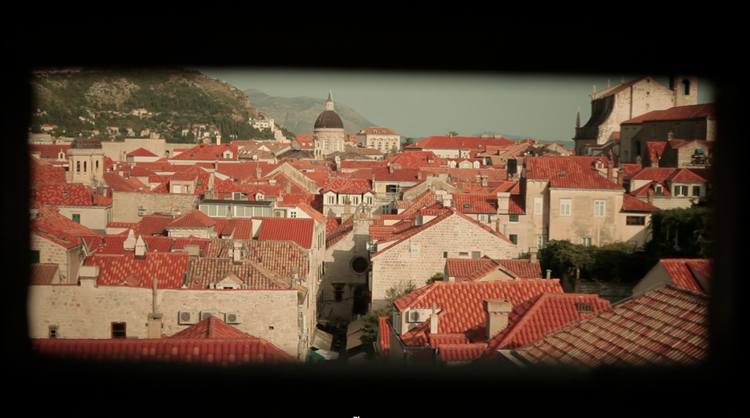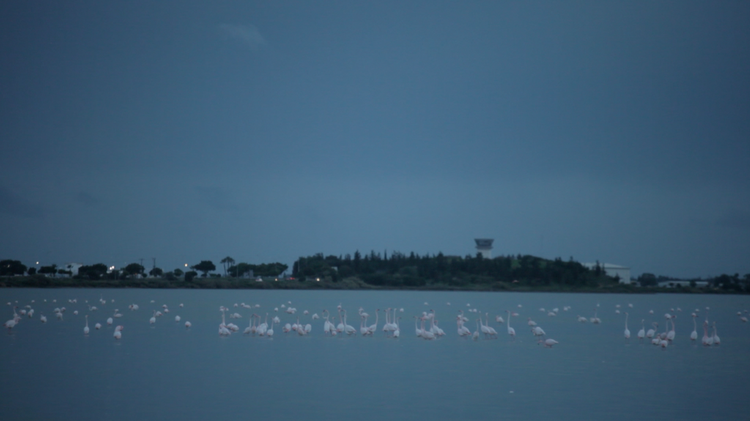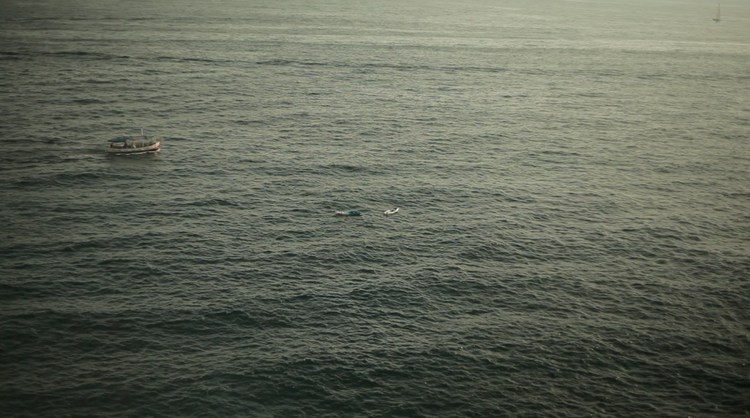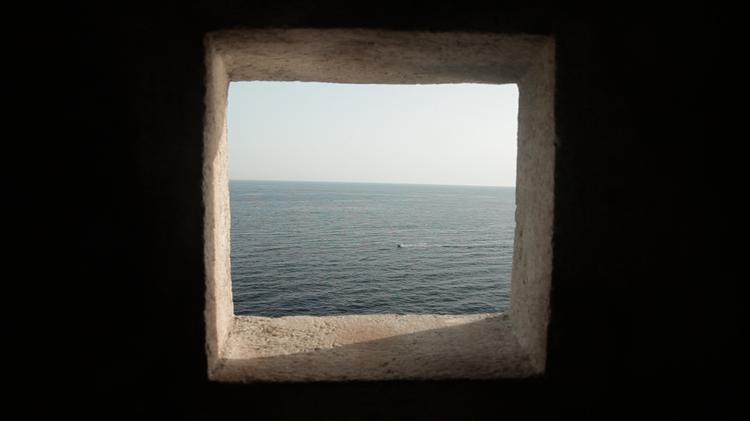Rigid Identities and Evaporating Borders: A Conversation with Iva Radivojevic
 Thursday, January 5, 2017 at 11:34AM
Thursday, January 5, 2017 at 11:34AM Interview by Bianka Ballina and Carlos Jimenez
[ PDF Version ]
Filmmaker Iva Radivojevic visited the University of California, Santa Barbara for a screening of her award-winning documentary Evaporating Borders (2014) on December 2015. We spoke to Radivojevic during her visit and are happy to include this conversation as part of this issue of Media Fields Journal centered on media and migration. This five-part documentary essay gives a provocative account of the ongoing refugee crisis in Europe through a rare glimpse at the island of Cyprus, which provides one of the easiest points of entry into the continent. Here, migrants face a series of material and legal difficulties compounded by a growing anti-immigrant sentiment among the national population.
Radivojevic’s narrative voice brings together her own personal reflections with testimonies by asylum seekers, local residents, authorities, as well as immigration activists and lawyers in Cyprus. The film takes us inside refugee camps, private homes, and various institutional spaces, culminating with an immersive portrayal of an antifascist rally and a confrontation between protesters, neo-Nazi fundamentalists, and the police. Radivojevic bookends her essay with the tragic story of 195 migrants who drowned in the Mediterranean Sea while trying to reach Europe, thus establishing a powerful connection between the violent social and natural forces that endanger the lives of refugees. The film’s multi-layered treatment of this complex issue is conditioned by the director’s own experience as a migrant. Radivojevic and her family arrived in Cyprus in 1992, after leaving their native Yugoslavia, then enmeshed in a growing political crisis and military conflict. Weaving personal, national, and global issues, Evaporating Borders turns a story about migration into a fascinating exploration into questions of individual and communal identity, belonging and exclusion, tolerance and discrimination, vulnerability and exploitation.

Figure 1. Antifascist protesters. Courtesy of Iva Radivojevic.
Bianka Ballina: We would like to start by talking about the production process fir this film. How did you get people involved in telling a story about migration, which isn't necessarily something that a lot of producers want to fund? Can you tell us more about how this project come about and how it developed?
Iva Radivojevic: Well, I started this project from an idea that I had, I guess it was one of those things that turns in your stomach, and it really wants to come out. It has to come out, you know? And it was my thesis project for my MFA. I had no funding originally so I applied for several grants and didn't get any. One of the reasons was that I was making a film about migration and about refugees and that had already been done in certain ways, or they were not interested in Cyprus. But I had such passion about this topic and this film that I decided to start it anyway. I decided to shoot, direct, edit, and do everything myself. I took my camera and went for three months to shoot. I started like that, with no money at all. But I did have family there, and I knew I could count on them to house me. Then I was able to get a grant to finish it.
Carlos Jimenez: Did you start to propose the project differently? Did you frame it differently the second time around?
IR: That's a great question. Normally you should do that. But because this was my first film and my first time doing these applications, I didn't really have the knowledge of how to do that. I didn't have the knowledge of how to talk about the film in different ways. And because everything was in my head, I couldn't balance ideas with trying to answer the questions they had. I tried to change it a little bit but nothing really worked. I only realize this because I'm working on a new project and the treatment for the applications has already changed three times. I realized each time what was missing and was not so clear. It's very important to have someone to help you balance it off; to help you figure out what's not clear, what's not coming through.
BB: How do you think you can balance the kind of idea you talk about, one that turns in your stomach and really wants to come out, and which you're so passionate about with the more pragmatic decisions such as these?
IR: I feel that what's most important is the passion, because if you have the passion it's going to happen one way or another.
BB: As an independent filmmaker, how do you go about distributing this film?
IR: This film is undistributable...because it's experimental in form, because it's in Greek, because it's about Cyprus, because it's not a character-driven film, and so many different reasons... If I had done the film in English, it would have been easier to distribute. But I felt very strongly that I didn't want to do that. What has helped is that universities have been purchasing the film a lot. I had a few offers for distribution that I didn't like, so I'm keeping the rights to it and eventually I'll release it online. It had a small theatrical run in New York, a few broadcasters in New York also screened it. Because I own the rights to it, I get the screening fees; so the film has been sustaining me for a year and a half. But in terms of a distribution deal, for this film, it's very hard.
BB: Tell us more about why you wanted to make the film in Greek.
IR: I'm speaking about Cyprus, and even though it is the place where I grew up, it is also not entirely my community. It is and it isn't. So I feel that when you speak the language, you understand the culture much better and you are an insider and an outsider at the same time. I wanted to communicate that to the Greek-speaking people and the Cypriot people; to say "I understand. I'm one of you. But I'm also not one of you." And if I speak Greek, I'm allowed in much more. I speak Greek with an accent. I'm fluent, but I speak with an accent. And that's a very vulnerable place to be also. I thought it was important for those reasons. Then there is the aesthetic reason—each language has a different melody, and I wanted to capture the texture of Greek. To speak Greek I had to slow down, and I wanted that kind of rhythm. I also realize that language is very important in terms of belonging. Over the past few years I have been traveling a lot in the former Yugoslavian countries, and whenever I'm in a place where I can speak the language I immediately feel a sense of belonging. The same thing happens when I go to Greece. I've never lived in Greece but because I can speak the language I feel a sense of belonging.

Figure 2. Cyprus skyline. Courtesy of Iva Radivojevic.
BB: Could you talk more about your own experience of migration and forced displacement? How does that experience influence the way you engage with film?
IR: My family left Yugoslavia when the war started in 1992 and moved to Cyprus, a divided place. There was a significant break up of family and a lot of things that happened that make you start asking questions about belonging and displacement. You start to ask yourself "where can I find my place?" and those things definitely affect my work. That doesn't only apply to a film like this one, that's directly related to my experience. It could be a film about schizophrenia, for example, which is also about looking for belonging, for a place, an identity. So it comes out in different ways, and I think that when you are aware of the things that influence us and changed us in certain ways, then they become something that you mean to resolve. I think in that sense every film I make is a question that I need to answer for myself.
BB: In the film's introduction, you mention all the different groups that make up the migrant population in Cyprus. You've also discussed how people were not really interested in funding a film about Cyprus. So, what do you think Cyprus has to tell us about migration that is different or that is representative of larger patterns?
IR: I always say this is not a film about Cyprus. It uses Cyprus as an example to talk about things that are happening right here, in Europe, in Australia...We're using Cyprus as a microcosm of a much larger issue. One thing that can be said is that Cyprus is a divided island. There was an invasion in 1974 and since then the island has been divided. There is a lot of Greek Cypriots in the south who see the new immigrants and refugees that are coming in as their Turkish invaders. If you're Muslim, you're immediately identified as the Turkish invader. So from there, already you see a significant distancing. And that is one thing that is unique to Cyprus and isn't necessarily true for other places.
BB: What about the flamingos? Were they a way to think about the relationship between human and animal migration?
IR: The flamingos are a motif that runs throughout the film. They are migratory birds that come to Cyprus every winter. And it is seen as a beautiful thing, and everyone is proud of these flamingos. The same thing happens with goods. They can travel back and forth and will certainly be welcome, but it's not the same with people, especially people coming from developing countries, or who are darker, or have a different religion...So I use the flamingos to make that comparison and to be ironic about it—"Oh look at these flamingos! Aren't they beautiful?”
BB: That was a great ironic intervention in the middle of such a tense moment in the film. Another issue you highlight is the role that media plays in fueling anti-immigrant sentiment in Cyprus. Was this something that came up as you were shooting or were you trying to position yourself to work against this kind of representations from the start?
IR: It was clear from the beginning. I wanted to show a different image and propose different ideas about refugees from what is seen in the media or what you hear when talking to most people.

Figure 3. Migrating flamingos. Courtesy of Iva Radivojevic.
CJ: I was really surprised by the striking similarities between the anti-immigrant rhetoric in Cyprus and here in the United States. Why do you think so many of the same images and feelings arise in different locations?
IR: I think, since our identity is so rigidly constructed and we have a certain set of beliefs, anyone who comes in with a different set of ideas is directly in conflict with what I believe. They're an attack on my sense of self. If I'm losing the things I identify with, it means that I'm dying. And that's ultimately what it is, fear of death. It's an imagined fear but I understand where it's coming from. We need to think about creating an inclusion of difference, instead of thinking about it as the threat of losing something. If you take the United States for example, if you think about the criminalization of Irish and Italian immigrants hundreds of years ago, or the similar responses to Jewish Holocaust refugees and Syrian refugees today, you realize it is the same idea that keeps coming up—that immigrants are taking something from us. Unfortunately, there is always this push to take advantage of the immigrant, whether through low pay or, for example, when we migrated to Cyprus they wouldn't let us stay in the country unless we purchased some property. It wasn't even legal, but the immigration officer would say something like "you have to leave tomorrow, unless you can buy something," and conveniently there's is a developer standing right there who has some properties to sell you. So even if you're not at the bottom of the food chain, like a refugee, they will find another way to take advantage of you. It can be in terms of money. In the United States you can buy a green card if you invest $500,000 in a business. Meanwhile, there are all these generalizations about Syrian refugees as dangerous, as terrorists who shouldn't be allowed in the United States. And that's possible because we fail to see the role that our own governments are playing in causing this crisis. We need to talk more about how our own governments are threatening the security of people in these areas instead.
BB: The notion of the migrant as someone you can exploit for profit certainly resonates with the U.S. immigration system, where immigrants spend months or even years in detention centers while they await deportation or while their cases are reviewed by immigration authorities. Over half of these detention centers are operated by private corrections companies, and the increase in undocumented migrants detained by Immigration and Customs Enforcement in recent years has made these centers more and more significant to the booming corrections business.
IR: Definitely. I can't confirm if this is true, but there are rumors that the very anti-immigrant member of Parliament that you see in the film is actually taking advantage of migrant laborers to build some properties in a nearby village, and of course, paying them nothing. And yet he keeps speaking very loudly against these refugees.
BB: Your film also showed the vast divergence between the law and what actually happens in practice, something you and your family also had to negotiate. Can you say a bit more about the tensions between what Cypriot law stipulates and the way migrants are treated in practice?
IR: At least while I was filming, the situation was very chaotic and we could never get a straight answer. The biggest problem is that the laws aren't implemented. The immigration lawyer we interview in the film gives the example of a migrant who was supposed to be released from detention, but they just didn't release him. He was there for six months. These kinds of things happen all the time and nobody is checking on these refugees, unless they have a lawyer who is keeping up with their case and trying to help them out. So it is just complete chaos in terms of applying the law. Since Cyprus is an EU country, when Amnesty International comes in and writes a report that paints Cyprus in a bad light, the authorities have to adjust. But there is no real change necessarily.
BB: I’d like to talk about how you thought about space in this film, about the role that space has in shaping migration but also the filmmaking process. How does that come through in your use of water and land?
IR: Water is really important; one, because Cyprus is an island and two, because we're talking about refugees who are arriving by boat. If you look at the film, there are a lot of literal borders built around how things are framed. That to me represents imprisonment and border vision, a limited vision, limited understanding. You almost feel like you're an outsider. You're looking through holes or windows. There's this idea that you're not part of this community, and that's something that I was thinking about in terms of space in this film. Water is also representative of the idea—to borrow from a great quote by Bruce Lee—that you should be like water. When you have these really tight identifications with things, you're not fluid like water. You're very rigid in your opinions and your views, and this is where xenophobia arises.

Figure 4. Navigating the Mediterranean Sea. Courtesy of Iva Radivojevic.
CJ: The film also allows us to have some intimate encounters with some of the interviewees. How did you go about gaining access to and entering these private spaces?
IR: My experienced helped. Of course there are important differences, I'm not a refugee. But, we have this shared sense of displacement. So I was able to communicate with them at that level, especially since we were all immigrants in Cyprus. That communication was more natural. And people really want to share their stories, especially in this desperate situations. They want to talk to journalists. They think it can help them. But I was very clear from the beginning about the fact that I was making a film but I didn't know where it was going to go. I also protected their identity and didn't show their faces if they didn't want me to. Some people were actually afraid of the media, they don't want to take a wrong step. But other people are really eager, they want to share as much as they can. I think if you're willing to listen, they want to share their story. News reports just come and take snippets, a sound bite here and there and they're out. But I kept on coming back and I'm still in touch with these people, so it's a different kind of relationship. There's trust building between us.
BB: Have you shared the film with them?
IR: I have shared it with some people, not everyone. But those I have shared it with are very touched.
CJ: So you shot all the footage and someone else worked with the sound. Did that make it easier to enter these spaces? Do you think the presence of the equipment and your own technique influenced what aspect of the migration experience you were able to access?
IR: I'm usually very unobtrusive with the camera. It's a very small camera to begin with. And my sound person is an activist. He's been working with the immigrants for a long time. More than anything, we were there to hear people's stories and to understand their situation. And if they wanted to talk to us, we would then figure out if and when to bring out the camera. But people weren't really phased by it. And many people were not afraid to say xenophobic things in front of the camera.
CJ: Do you think there is something particular that film can do in relation to the issue of migration? Is there something it has a responsibility to do?
IR: Ideally, a film would affect people. I don't go into a film as an activist, thinking about how it should be received in the world. Instead I'm trying to express and create something. I think with this film, I just needed to be as transparent as possible about the position I'm speaking from—who I am, why I'm telling you this story, in what way am I telling you the story. I have to be very transparent about that so you can see that I'm giving you one version of the truth, my version of the truth rather than an absolute truth. That way you can decide if you agree or not. And it those self-reflexive moments, I ask the viewer the same questions. I think what is most rewarding is the process of making the film, the people you meet and the kinds of relationships you develop with them. I get very involved and make friends wherever I'm filming. It is very important for me to have a relationship to the people I'm filming. For example, the poem at the end by the Iraqi refugee is very special to me. His work had never been published, and when he gave us the poem and saw that we had included it in the film, he was very moved because to him, that was the first time his work was being published. As the film screens around the world, the poem is one thing everyone notices and comments about. And that's the most beautiful thing. Even that small thing for me is huge. Luckily the film has had a very successful life. It has been screened not only in film festivals but also in NGOs, universities, activist spaces, anti-fascist rallies, and so on. So it's been used for different causes and I'm really happy about that.

Figure 5. Boundaries and flows. Courtesy of Iva Radivojevic.
CJ: You are clearly drawn to images that connote questions about borders and rigidity. We would like to end by going back to this point. Could you tell us more about how you approached these issues through different aspects of this film?
IR: It's funny because the film very much came together as a collage. When I was shooting, I wasn't thinking that I needed a shot of this or that. It's more of an intuitive process, also an unconscious process in some ways. So yeah, I am drawn to it. But I also have an idea in mind of what I want to address, and that is somehow framed through those images. Or it's a feeling that I have when I'm looking at those images. It's very intuitive. But I do think that we're all guilty of such border thinking and rigid views. And that's the main idea that I would like the film to express; I want the viewer to ask "how am I participating in this? What is my responsibility and how do I communicate with the world?" There is also a self-reflexive moment in the film, when I encounter the two Eastern European men, and I see myself reacting in the same way as the neo-Nazis do to these men who are actually from my own culture. I have to interrogate myself as well. I can't just point the finger at other people because I know I'm guilty of the same reaction, and I know that everybody does it. And that becomes really important, not to point fingers but to say "hey, let's look at what we're all doing.”
BB: In a sense you're also pointing out that identity is rigid yet flexible enough that you can forget that these two men are part of your own culture and internalize somebody else's perception of them.
IR: That's the thing. Your identity becomes flexible depending on where you are. So for example, in the United States, I'm white and fall into a certain category of privilege. In Cyprus, I'm an Eastern European woman, which means that I come from a very poor country, it means that our social status is very low. As a woman from Eastern Europe, we're associated with sex work. So it's a very big difference. That identity changes depending on where you are. In Cyprus I internalize that discrimination and I become judgmental toward my own self. It's a very psychotic kind of experience.
Iva Radivojevic is a filmmaker based in Brooklyn, New York. She lived in Yugoslavia and Cyprus before settling in New York City. Her films have been screened at the Museum of Modern Art and various international film festivals, including the New York Film Festival, SXSW, Rotterdam IFF, Human Rights Watch, and HotDocs. Her work has also been broadcast on PBS, the Documentary Channel, and the New York Times Op-Docs. Radivojevic was awarded the Guggenheim Fellowship in 2015, the Princess Grace Special Project Award in 2012, and the Princess Grace Film Fellowship in 2011. She was profiled as part of Filmmaker Magazine’s list of “25 New Faces of Independent Film 2013.” Evaporating Borders is Radivojevic’s first feature-length documentary, with Laura Poitras as Executive Producer, Jay Rabinowitz as Consulting Editor, and Leandros Savvides, and Landon Van Soest as Producers. The film has received multiple awards and honors worldwide.